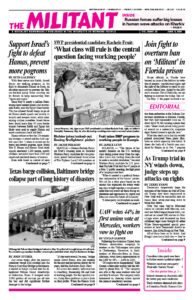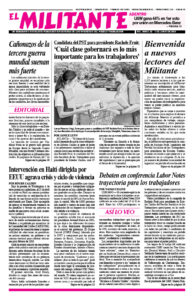The following is an excerpt from an interview with SWP presidential candidate Rachele Fruit by Jillian Diamond that appeared in the Baltimore Jewish Times online May 17. It is slated to appear in the next print edition.
BALTIMORE JEWISH TIMES: Rachele Fruit has been running for office on a socialist platform since the 1970s. Now, she’s running for president as the candidate for the Socialist Workers Party. …
You used to be a Baltimore resident. Could you tell me about that?
RACHELE FRUIT: I was the first woman they hired to work on the ramp at Eastern Air Lines in 1986. And then I got laid off, and I worked the rest of the time in the garment industry. I worked at Jos. A. Bank for five years making men’s suits both as a sewer and a presser.
I was politically active in many, many different things, like the fight against apartheid. I was in Baltimore when Nelson Mandela was released from prison and elected president. But I’ve been active in the labor movement for all of my working life. …
There’s a new need to speak out against antisemitism and Jew-hatred, which is on the rise in the world today, and to defend Israel’s right to exist as a refuge for Jews, which is more obvious every day, but it’s necessary.
JEWISH TIMES: There have been comparisons made between the current anti-Israel protest movement and the protests against the Vietnam War and South African apartheid. As someone who was involved in both, how do you think this is different from those movements?
FRUIT: I think it’s a completely false analogy. In the case of the Vietnam War, you had a revolution against imperialism going on in Vietnam, which people were attracted to and wanted to defend and understand. It was the beginning of a whole generation learning about what U.S. imperialism is and what it does to the people and the resources of the world. And in this case, this is not a case of supporting a liberation movement in any way. And anyone who is interested in reading and learning about the history of Hamas will be convinced that it’s not about liberation. It’s about genocide against the Jews.
And that’s an important point because there is a legitimate Palestinian liberation struggle, but there’s no leadership. To resolve the Palestine national question and the Jewish national question will take the working class of both people to find a way to work together to figure out how to live together on the same land and move forward.
The South Africa analogy is also extremely important because the goal of the African National Congress was to have all residents of South Africa to live together on the land, and their opponents’ position was “one settler, one bullet,” which was to drag the whites out of the country. And that’s much more in line with Hamas’ position. Mandela defended the Jews in South Africa and talked about an important role they played in the country and in the liberation struggle.
JEWISH TIMES: Why do you think it’s still important to have third-party options in presidential elections?
FRUIT: One of the main planks in our platform is that workers should break from the Democratic and Republican Party. Neither one has the interests of the working people in mind. Their policies defend the interests of the ruling rich. So we call for a labor party, a working-class party that will organize us to fight for the things that we need, against inflation, for higher wages and safer working conditions.
This is why unions are extremely important, but we also need a vehicle to fight in the political arena. And our party is an example of that. It’s an example that workers can look towards of how we can organize an independent party. You have to start somewhere, and we’ve been speaking all over the country, talking to workers on picket lines and all kinds of protests. So to get this message across, and there’s a lot of interest, we ask anyone who agrees that we need our own party to speak for our interests to endorse our campaign. It’s the beginning, it’s an example.

